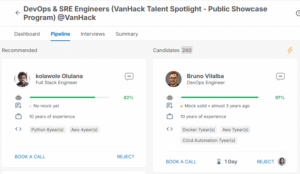For scaling startups, finding the right Node.js developers is a key step to keep pace with growth. Moving from early funding stages to more established rounds, like Series A to C, means you need skilled developers to push your product forward and stay competitive. Old-school hiring tactics, such as generic job boards or relying solely on referrals, often fall short when it comes to finding specialized talent with deep JavaScript expertise. Start recruiting with Vanna now to streamline your Node.js hiring with AI-driven matching and thorough technical vetting.
Quick Overview and Hiring Framework
This guide offers engineering leaders a clear plan to hire Node.js developers, addressing both urgent needs and long-term team growth.
Key Terms to Know
Talent acquisition goes beyond just filling roles. It includes planning your workforce, building your brand as an employer, and maintaining candidate relationships. For Node.js positions, this means creating a pool of JavaScript experts ready to hire when the time comes.
Node.js roles vary by experience level:
- Senior (5-8 years): Handles complex features independently, mentors juniors, contributes to system architecture.
- Staff (8-12 years): Leads across teams, owns system design, shapes tech decisions for multiple products.
- Principal (12+ years): Drives company-wide tech strategy, brings industry knowledge, represents the company externally.
Compensation for Node.js developers often reflects their high demand. Salaries are typically above average, and for senior roles in startups, equity packages play a big role in attracting talent tied to long-term company success.
Aligning Hiring with Business Goals
Your Node.js hiring should match three core areas of your business:
- Product Plans: Focus on developers who can tackle upcoming challenges, like building microservices or real-time features. Seniors speed up development and keep technical debt in check.
- Funding Stages: Investors look closely at your team’s strength. Showing a solid Node.js hiring plan can boost confidence in your ability to scale.
- Market Edge: If your startup competes on API quality or innovation, you need Node.js talent with skills in performance tuning, security, and scalable design.
Deciding: Build or Outsource Hiring
Building an in-house hiring process works if:
- You have dedicated recruiters and a strong technical interview setup.
- You plan to hire multiple Node.js developers each year.
- Your brand is well-known in the JavaScript community.
- You can wait 3-6 months to fill senior roles.
Partnering with external experts makes sense when:
- Product deadlines demand quick access to Node.js skills.
- Your team lacks deep JavaScript knowledge for proper evaluations.
- You want global talent but find logistics challenging.
- Cost efficiency per hire outweighs controlling the process.
Understanding the Node.js Talent Market
Where Node.js Developers Work
The Node.js talent pool splits into distinct groups, each with unique hiring challenges.
- Big Tech: Companies like Google or Microsoft hire many senior Node.js developers with high pay. Yet, some seek startups for more ownership and impact.
- Startup Scene: Developers move between startups for new challenges and career growth. This offers hiring chances but requires strong retention plans.
- Freelancers/Agencies: These developers bring varied Node.js experience but may need time to adapt to in-house team dynamics.
- Global Regions: Areas like Latin America and Eastern Europe have growing numbers of skilled Node.js developers looking for remote or relocation opportunities, often at a cost advantage.
How Hiring Tools Have Evolved
General job boards often attract many applicants but few qualified Node.js candidates. Non-specialized recruiters may struggle to assess technical skills, slowing down the process. Developer-focused platforms improve candidate quality but might miss evaluating senior-level leadership. Meanwhile, AI-driven matching tools cut screening time by aligning job needs with candidate skills more accurately.
Trends Shaping Node.js Hiring
- Remote Work: Global competition for Node.js talent has increased, but it also opens doors to diverse teams across regions.
- Rising Salaries: Pay for Node.js developers, especially seniors with modern framework skills, has climbed. Balancing cash and equity offers is key.
- Community Involvement: Engaging with JavaScript communities on platforms like GitHub or at conferences helps attract talent organically.
- Employer Reputation: Candidates value engineering culture and growth potential over just salary when choosing a company.
Key Choices and Trade-offs in Hiring
Costs of Building vs. Partnering
Setting up internal hiring for Node.js roles means investing in technical recruiters, engineer time for interviews, and branding efforts. It gives you control but requires significant resources upfront. External partnerships, with fees based on salary percentages or flat rates, speed up hiring and tap global networks, though they limit internal skill-building. A hybrid model, mixing internal cultural screening with external technical sourcing, often balances cost and strategy.
Time and Quality Balance
Delays in hiring Node.js talent can stall features, pile up technical debt, or burn out your team. Traditional methods take 36-42 days for senior roles, while specialized platforms can cut this to 14-21 days. Rushing risks poor fits, but over-vetting might lose great candidates to faster competitors. Prioritize early technical screens to make decisions quickly.
Managing Team Changes
Bringing in senior Node.js developers shifts team roles and dynamics. Plan for clear role definitions and communication updates. Remote or international hires add diversity but need structured onboarding to align work styles. Also, new seniors taking on architectural decisions might clash with current setups, so collaborative planning is essential.
Measuring Hiring Success
New Node.js hires should show impact within 30-90 days through faster feature delivery or better code quality. Retention matters, with industry turnover at 13.2% yearly, so focus on varied challenges and growth paths. Senior hires should lift the whole team by mentoring and improving reliability, reducing bugs, and speeding up projects.
How to Assess Node.js Developers Effectively
Evaluating Senior-Level Skills
Assessing senior Node.js talent goes beyond coding to include architecture, optimization, and leadership.
- JavaScript/TypeScript: Mastery of async patterns, memory use, and modern features.
- Node.js Tools: Knowledge of frameworks like Express.js, testing tools, and security practices.
- System Design: Skills in microservices, APIs, databases, and caching.
- DevOps Basics: Experience with containers, CI/CD setups, and cloud platforms.
Modern evaluations focus on system design alongside coding, testing scalability and reliability thinking. Live coding should mimic real tasks, like API design or debugging, with candidates explaining their approach. Architectural talks reveal how they communicate complex ideas and align with your tech culture, as detailed in scenario-based interview tips.
Benefits of AI in Technical Reviews
AI tools in recruiting improve efficiency and fairness in assessing Node.js skills. Asynchronous interviews, like those on VanHack’s Vanna, let candidates record responses anytime, offering videos, transcripts, and scores for review. Objective metrics reduce bias and standardize comparisons. Detailed records from AI interviews also aid team discussions and future reference.
Checking Communication and Fit
Short video intros give quick insight into a candidate’s English skills and professionalism, vital for remote Node.js teams. Global hiring needs cultural adaptability, assessed through flexibility and collaboration style. Senior roles in 2025 value behavioral skills like conflict resolution and leadership. Use structured methods, such as the STAR framework, to evaluate teamwork and adaptability.
Speed Up Node.js Hiring with VanHack’s Vanna
AI-Driven Recruiting for Node.js Talent
VanHack’s Vanna uses AI to simplify hiring senior Node.js developers for startups. It matches candidates using advanced language models, analyzing job needs against a database of over 500,000 tech pros. Instead of sifting through countless resumes, you get a shortlist of 3-5 vetted candidates. Vanna also connects you to talent in regions like Latin America for timezone and cost benefits.
Unified Candidate Insights
Vanna combines all evaluation data into one view. Most profiles include brief videos for assessing communication upfront. AI technical interviews provide full recordings, transcripts, and scores, showing problem-solving in action. Coding test results are also integrated, confirming skill levels with clear benchmarks.
Efficient Hiring Process
Manage candidates with a Kanban-style interface for easy tracking and team collaboration. Built-in messaging and scheduling cut coordination time, while shared workspaces allow multiple team members to review and decide together, keeping the process moving.
Support for Global Hires
VanHack offers end-to-end help for international Node.js hires. Immigration consultants manage visas for candidates and families at no extra cost. Coordinators assist with housing, flights, and cultural onboarding. Local community groups in major cities help relocated developers settle in, boosting retention. Chat with Vanna now to see how AI recruiting can grow your team.
Avoid These Node.js Hiring Mistakes
Misjudging Senior Skill Needs
Startups often overlook the gap between mid-level and senior Node.js talent, risking project delays. Seniors need expertise in distributed systems and optimization, not just coding, as outlined in senior engineer expectations. They must also lead teams and explain tech impacts on business goals. Evaluate for these broader skills during hiring.
Ignoring Cultural Fit in Global Teams
Remote or international developers may communicate differently. Set clear protocols early. Timezone overlaps need defined collaboration hours and async norms. Discuss career growth expectations to avoid future disconnects.
Sticking to Local Talent Only
Restricting hires to local areas limits quality and raises costs. Global markets offer skilled Node.js developers at 30-60% lower rates, plus diverse perspectives that fuel innovation.
Relying on Slow Manual Reviews
Manual screening eats up time and risks inconsistent results. AI tools provide deeper insights into problem-solving and communication without extra effort.
Underestimating Relocation Challenges
Immigration processes are complex and time-consuming without expert help. Beyond logistics, relocated developers need support for housing and cultural adjustment. Family needs, like schooling, also matter for smooth transitions. Avoid these issues with VanHack’s systems. Start hiring with Vanna for vetted global talent and full support.
Are You Ready to Hire Node.js Talent?
Assess Your Current Setup
Evaluate your hiring process before scaling up:
- Basic: Reactive hiring, minimal technical checks, informal fit reviews.
- Developing: Standard job roles, organized interviews, basic screening.
- Advanced: Full talent strategy, detailed assessments, strong onboarding.
Check if your team can assess Node.js skills, understand modern JavaScript needs, and support remote or global hires with the right tools and culture.
Align Your Team and Plan
Sync technical leads, HR, and executives on hiring priorities. Identify engineers for assessments and supporters for onboarding international talent. Prioritize roles by impact, like those tied to launches or leadership gaps. Time hires with product sprints, funding rounds, or market trends for best results.
Advanced Hiring Challenges to Watch
Even experienced startups face nuanced hiring issues. Overly complex interview processes can deter top Node.js candidates. Seeking perfect fits delays hires, letting competitors swoop in. Focus on efficiency and candidate experience. Cultural integration, especially for remote hires, needs more than tech skill checks. Senior additions can disrupt team dynamics if not managed. Also, short-term cost-saving or underusing tech tools like AI platforms limits long-term success. Global hiring adds legal and retention layers to plan for. Address these with VanHack’s support. Find top talent using AI assessments and global services.
Common Questions About Node.js Hiring
What’s the average salary for senior Node.js developers?
In North America, senior Node.js developers earn $120,000-$180,000 yearly, with higher roles reaching over $200,000 plus equity. VanHack connects you to talent in regions like Latin America at lower costs while staying competitive locally, stretching your budget further.
How fast can I hire a senior Node.js developer?
Traditional hiring takes 36-42 days, often longer due to limited quality candidates. VanHack’s AI platform shortens this with pre-vetted shortlists and streamlined assessments.
Does VanHack support remote Node.js hires outside North America?
Yes, VanHack focuses on linking North American startups with talent from Latin America for remote roles, accessing a pool of over 500,000 professionals with timezone and cost benefits. Video intros and vetting ensure remote readiness.
How does VanHack verify technical skills?
VanHack uses AI interviews with recordings, transcripts, and scores per response, plus integrated coding tests for objective benchmarks. Videos and profiles add depth to assess communication and fit before final talks.
Is relocation help available for international hires?
VanHack’s global mobility team manages visas, housing, flights, and cultural integration at no extra cost. Hires can start remotely during visa processing, and local communities aid settling in.
How does VanHack’s pricing compare?
Vanna’s $3,000 monthly subscription covers unlimited hires, cheaper than traditional agency fees per hire. Mobility services are included, adding value over fragmented recruiting options.
What Node.js skills does VanHack assess?
VanHack evaluates JavaScript fundamentals, Node.js tools, async coding, database handling, system design for seniors, and soft skills like leadership for team impact in startup settings.
Final Thoughts: Build Your Node.js Team for Growth
Hiring Node.js developers is vital for startups aiming to innovate and scale. It affects how fast you build products, the quality of tech decisions, and your market position. VanHack’s AI matching, technical vetting, global access, and mobility support address modern hiring needs efficiently. Deciding between in-house recruiting or partnering depends on your resources and timeline, but tech-driven solutions are increasingly essential. Ready to boost your Node.js team? Start recruiting with Vanna now to find top developers and drive your startup forward.
“



